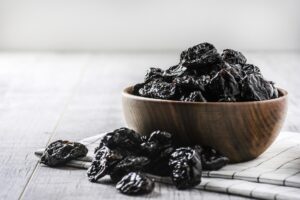
In the United States, approximately 10 million adults over the age of 50 have osteoporosis. According to previous research, women are four times more likely to get a diagnosis of the condition. This may be partly due to a decline in estrogen levels at the onset of menopause that often results in the loss of bone density. However, new research from Penn State shows that eating prunes daily may help women preserve bone density.
The study included 235 postmenopausal women, some of whom were assigned to eat 50 grams (approximately 5-6 prunes) each day for a year. The researchers measured the women’s bone mineral density, bone strength, and bone geometry and found that prunes may be beneficial.
“Consuming five to six prunes a day for 12 months resulted in the preservation of bone at the hip, a finding that was observable at six months and persisted through month 12. In another study, 3D imaging of bone provided additional information about the response of bone to consuming prunes daily,” said lead author Mary Jane De Souza.
Knowing about diet and food facts, including which can help keep bones strong and healthy, can help to prevent bone fractures as you age. Prunes make a great snack that are not only full of fiber but great for bone health.
Bone and Joint Health
Supporting bone health is essential as you age. Bone Rescue can help to support the maintenance and development of bones thanks to its unique formula, including strontium. Chemically similar to calcium, strontium can provide great support for aging bones. Bone Rescue contains 680 mg of strontium along with additional ingredients to help keep bones strong and healthy.
As you age, your joints may also require support to help them stay strong, flexible, and healthy. Healthy Joints contains multiple ingredients to help support and improve joint health. The primary ingredient in Health Joints is AprèsFlex®, an extract from Boswellia, which has been found in studies to provide rapid support for joint health and mobility. This unique formula also contains glucosamine and chondroitin, which contain compounds that are some of the building blocks of healthy joints.